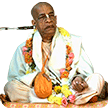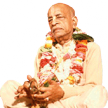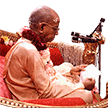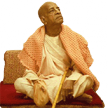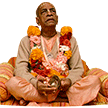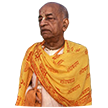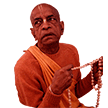Sakuntala - a glorious personality: Difference between revisions
(Created page with "Category:Glorious Personalities Category:Glorious Personalities from Bhagavad Gita Category:Glorious Personalities from Srimad Bhagavatam Category:Glorious Perso...") |
No edit summary |
||
| Line 10: | Line 10: | ||
{{Personalitiesnav}} | {{Personalitiesnav}} | ||
<!----------------- BEGIN STANDARD HEADING -----------------> | <!----------------- BEGIN STANDARD HEADING -----------------> | ||
Srila Prabhupada's books, lectures, conversations and letters reveal the qualities of this glorious personality as seen in the Vaniquotes '''[[Vaniquotes:Category:Sakuntala|Sakuntala]]''' category. An introduction from his teachings is given below in the following | Srila Prabhupada's books, lectures, conversations and letters reveal the qualities of this glorious personality as seen in the Vaniquotes '''[[Vaniquotes:Category:Sakuntala|Sakuntala]]''' category. An introduction from his teachings is given below in the following 8 quotes. | ||
<!----------------- END STANDARD HEADING -----------------> | <!----------------- END STANDARD HEADING -----------------> | ||
---- | ---- | ||
== Quotes from Srila Prabhupada's teachings == | == Quotes from Srila Prabhupada's teachings == | ||
<!----------------- edit quote boxes below this line -----------------> | <!----------------- edit quote boxes below this line -----------------> | ||
{{VaniQuotebox| | {{VaniQuotebox|Even the advanced yogi Visvamitra broke his mystic practice to unite with Menaka and beget a child known as Sakuntala. The practice of mystic yoga, therefore, is not sufficiently strong to control the senses| Even the advanced yogī Viśvāmitra broke his mystic practice to unite with Menakā and beget a child known as Śakuntalā. The practice of mystic yoga, therefore, is not sufficiently strong to control the senses. Another example is Prince Āgnīdhra, whose attention was drawn to the movements of Pūrvacitti, the Apsarā, simply because he heard the tinkling of her ankle bells. '''(Śrīmad-Bhāgavatam 5.2.5)'''}} | ||
{{VaniQuotebox| | {{VaniQuotebox|There (in the residence of Kanva Muni) King Dusmanta saw a most beautiful woman (Sakuntala) who looked exactly like the goddess of fortune and who sat there illuminating the entire asrama by her effulgence|Once when King Duṣmanta went to the forest to hunt and was very much fatigued, he approached the residence of Kaṇva Muni. There he saw a most beautiful woman who looked exactly like the goddess of fortune and who sat there illuminating the entire āśrama by her effulgence. '''(Śrīmad-Bhāgavatam 9.20.8-9)'''}} | ||
{{VaniQuotebox| | {{VaniQuotebox|The King, (Dusmanta) who knew the laws of marriage, immediately married her (Sakuntala) by chanting the Vedic pranava (omkara), in accordance with the marriage ceremony as performed among the Gandharvas|When Śakuntalā responded to Mahārāja Duṣmanta's proposal with silence, the agreement was complete. Then the King, who knew the laws of marriage, immediately married her by chanting the Vedic praṇava (oṁkāra), in accordance with the marriage ceremony as performed among the Gandharvas. '''(Śrīmad-Bhāgavatam 9.20.16)'''}} | ||
{{VaniQuotebox| | {{VaniQuotebox|As far as Maharaja Dusmanta was concerned, he desired Sakuntals as his wife from the very beginning, as soon as he saw her, so the agreement to unite as husband and wife was natural|Śakuntalā clearly said, "Your Majesty may stay here, and you may accept whatever reception I can offer." Thus she indicated that she wanted Mahārāja Duṣmanta as her husband. As far as Mahārāja Duṣmanta was concerned, he desired Śakuntalā as his wife from the very beginning, as soon as he saw her, so the agreement to unite as husband and wife was natural. To induce Śakuntalā to accept the marriage, Mahārāja Duṣmanta reminded her that as the daughter of a king she could select her husband in an open assembly. '''(Śrīmad-Bhāgavatam 9.20.15)'''}} | ||
{{VaniQuotebox| | {{VaniQuotebox|After Menaka, the celestial woman who had come to delude Visvamitra Muni, gave birth to the child Sakuntala, she left both the child and her husband and returned to the heavenly planets|There are many instances in which Apsarās, heavenly angels, have descended to this earth by the order of a superior demigod like Lord Brahmā or Lord Indra, have followed the demigod's order by marrying someone and giving birth to children, and have then returned to their celestial homes. For example, after Menakā, the celestial woman who had come to delude Viśvāmitra Muni, gave birth to the child Śakuntalā, she left both the child and her husband and returned to the heavenly planets. '''(Śrīmad-Bhāgavatam 5.2.20)'''}} | ||
{{VaniQuotebox| | {{VaniQuotebox|After Maharaja Dusmanta's death, Bharata, the son of Sakuntala, was enthroned. He performed many great sacrifices, in which he gave great riches in charity to the brahmanas|After Mahārāja Duṣmanta's death, Bharata, the son of Śakuntalā, was enthroned. He performed many great sacrifices, in which he gave great riches in charity to the brāhmaṇas. This chapter ends by describing the birth of Bharadvāja and how Mahārāja Bharata accepted Bharadvāja as his son. '''(Śrīmad-Bhāgavatam 9.20 Summary )'''}} | ||
{{VaniQuotebox| | {{VaniQuotebox|To induce Sakuntala to accept the marriage, Maharaja Dusmanta reminded her that as the daughter of a king she could select her husband in an open assembly|To induce Śakuntalā to accept the marriage, Mahārāja Duṣmanta reminded her that as the daughter of a king she could select her husband in an open assembly. In the history of Āryan civilization there have been many instances in which famous princesses have selected their husbands in open competitions. For example, it was in such a competition that Sītādevī accepted Lord Rāmacandra as her husband and that Draupadī accepted Arjuna, and there are many other instances. '''(Śrīmad-Bhāgavatam 9.20.15)'''}} | ||
{{VaniQuotebox| | {{VaniQuotebox|Maharaja Dusyanta fell in love with Sakuntala in the forest, and Bharata was conceived. After that, Maharaja forgot his wife Sakuntala by the curse of Kanva Muni, and the child Bharata was brought up in the forest by his mother|Mahārāja Duṣyanta fell in love with Śakuntalā in the forest, and Bharata was conceived. After that, Mahārāja forgot his wife Śakuntalā by the curse of Kaṇva Muni, and the child Bharata was brought up in the forest by his mother. Even in his childhood he was so powerful that he challenged the lions and elephants in the forest and would fight with them as little children play with cats and dogs. '''(Śrīmad-Bhāgavatam 1.12.20)'''}} | ||
<!----------------- edit quote boxes above this line -----------------> | <!----------------- edit quote boxes above this line -----------------> | ||
Latest revision as of 11:50, 23 December 2016
INTRODUCTION TEXT TO BE WRITTEN
Srila Prabhupada's books, lectures, conversations and letters reveal the qualities of this glorious personality as seen in the Vaniquotes Sakuntala category. An introduction from his teachings is given below in the following 8 quotes.
Quotes from Srila Prabhupada's teachings
Sakuntala - explore more within this category.
Vanipedia has now over 215 introductory articles compiled from Srila Prabhupada's teachings under the series titled Glorious Personalities. All these articles can be seen in the Table of Content on the right side of this article and also here in this Umbrella Category. Browse through them to relish the breadth and depth of Srila Prabhupada's teachings - There is an attractive personality for everyone.
